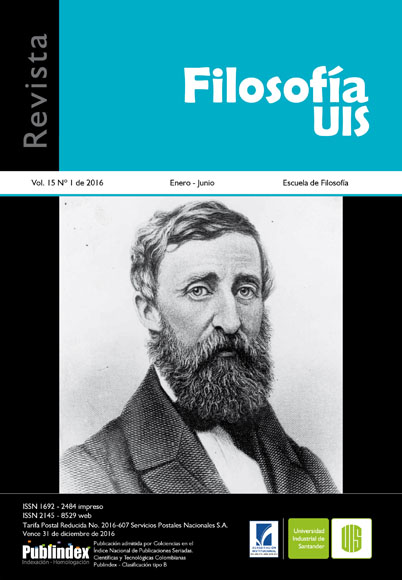Research Article
Kinesthetic experience and intersubjective experience
Published 2017-01-20
Keywords
- kinesthesia,
- intersubjectivity,
- phenomenology,
- phenomenological method,
- corporality
How to Cite
Villamizar Blanquicet, H. C. (2017). Kinesthetic experience and intersubjective experience. Revista Filosofía UIS, 15(1), 189–209. https://doi.org/10.18273/revfil.v15n1-2016009
Copyright (c) 2016 Revista Filosofía UIS

This work is licensed under a Creative Commons Attribution 4.0 International License.
Abstract
This article pretends to explore the existent relation between kinesthetic and intersubjective experience. The kinesthetic trait is primarily present in our everyday experience. This trait is also intrinsically linked with our knowledge of other humans (intersubjectivity). In order to achieve a clearer view of the relation between these two phenomena, the phenomenological method seems like the ideal one to make a more accurate approximation.Downloads
References
- Husserl, E. (1991). La Crisis de las Ciencias Europeas y la Fenomenología
- Trascendental. Barcelona: Editorial Crítica.
- Husserl, E. (2000). Ideas Relativas a una Fenomenología Pura y una Filosofía
- Fenomenológica. Libro Tercero: La Fenomenología y los fundamentos de las ciencias.
- Ciudad de México: Editorial Universidad Nacional Autónoma de México.
- Husserl, E. (2010). Thing and Space: Lectures of 1907. Netherlands: Kluwer
- Academic Publishers.
- Sheets-Johnstone, M. (1998). The Primacy of Movement. Amsterdam: John
- Benjamins Publishing Co.
- Sheets-Johnstone, M. (2010). Body and Movement: Basic Dynamic Principles. En
- D. Schmicking y S. Gallagher (Eds.), Handbook of Phenomenology and Cognitive
- Science (pp. 217-234). Dordrecht, New York, Heidelberg, London: Springer.
- Zahavi, D. (1996). “Husserl’s Intersubjective Transformation of Transcendental
- Philosophy”. Journal of the British Society for Phenomenology, 27 (3), 228-245.
- Zahavi, D. (2003). Husserl’s Phenomenology. Stanford: Stanford University Press.
- Zahavi, D. (2005). Subjetivity and Selfhood, Investigating the First-Person
- Perspective. Massachusetts: The MIT Press.
